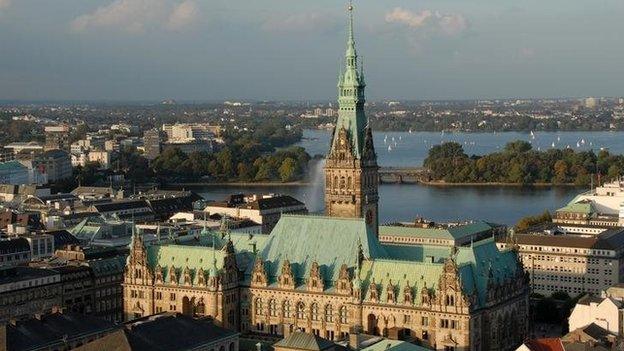Hooray for a flatlining eurozone
- Published
- comments

Hamburg has a proud history as the powerhouse of Germany's export trade
Miniscule growth in the eurozone is better than none, but no bulwark against eventual fracture of the currency union.
It is a rum old world in which growth of 0.2% in the eurozone between the spring and autumn is regarded as a goodish result.
The depressing point (and I mean that in the economists' technical sense) about the single-currency area is that growth, any growth, is a treat.
But just for the sake of context, and not as any kind of counterweight to the immoveable fact that in football British national teams look ordinary compared even to Belgium (also a meagre 0.2% growth), I feel moved to point out that the UK grew almost four times as fast in the same period (and the US faster still).
In a way it is remarkable the eurozone expanded even as fast as that, because Germany - its biggest constituent - saw barely perceptible growth of 0.1% (of course no one feels any schadenfreude when an economy driven by other people's spending stagnates because other people can't spend
And Italy returned to technical recession, diminishing by 0.1%, after a contraction of 0.2% in the previous three months. Italy is Europe's incredible shrinking economy.
As for France, its growth of 0.3% was better than expected - but partly because government spending was higher than expected.
And this spending will presumably have to be squeezed, unless France is to permanently rebuff pressure from Germany and the European Commission to reduce its public-sector deficit to less than 3% of national income.
Gosh it must be tiresome for France's president that he is seen as the eurozone's fiscally naughty boy, when across the channel he sees a British chancellor, outside the euro, shrugging off a deficit twice as big.
The point is that the eurozone's recession may have ended more than a year ago, but it seems as far away as ever from reaching what wonks would call escape velocity - or the kind of growth that would put a dent in too-high unemployment and too-high debts.
Apart from the provision of cheap and plentiful finance, something which the European Central Bank, is labouring overtime to supply, there also needs to be more demand for goods and service.
Conspicuously that isn't coming from the eurozone's consumers, with the volume of retail spending having fallen 1.3% in September.
It could come from the well-heeled German government, if it could be persuaded to delay its so-called Black Zero of balancing the books next year - by, as a minimum (some would say), restoring infrastructure spending to the levels of 20 years ago.
Maybe, as many Germans told me this week, there is no need for Mrs Merkel's administration to take any kind of a detour on its fiscal course - because the immediate risk of eurozone fracture has receded.
But if there is no proximate danger of highly indebted eurozone governments, like Italy's, being deprived of the life-preserving loans they need, if the potentially explosive financial pressures aren't as powerful as they were, there appears to be a different bomb ticking away.
The big immediate risk to the eurozone's integrity is the rise and rise of political parties implacably opposed to the currency union.
It is ordinary people and their votes - not bankers and hedge funds with their devastating ability to withhold credit - which will decide the eurozone's fate.
And its survival would not seem rational if it cannot demonstrate any ability to generate growth and thus create jobs.
Twitter: @Peston